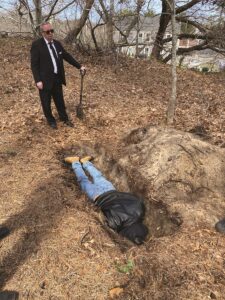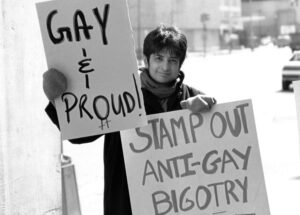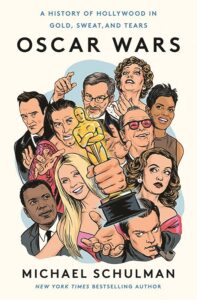As the Provincetown International Film Festival (PIFF) counts down to its 2023 launch next Wednesday, it feels bittersweet to recognize the 25th anniversary of this local extravaganza of screenings and events. That’s because the world of cinema is in such a state of flux: commercial theaters are half-empty or worse, and it has become inescapably apparent that the Covid pandemic was the coup de grâce to the widespread practice of watching movies on a big screen.
Film festivals around the country are reeling financially after being shut down for a year or more, but in Provincetown, PIFF is back in force with a program of new narrative features, documentaries, and shorts, with premieres, special screenings, and the usual round of awards.

“Filmmakers want festivals to continue,” says Artistic Director Lisa Viola. “Festivals play a crucial role. They are vital for independent films. And audiences are hungry for it.”
As proof of the desire to make films, Viola cites the number of shorts that were submitted to the festival this year: more than a thousand — three times as many as last year. “Our festival became an Academy Award–qualifying festival in three categories of short films: best narrative, best documentary, and best queer short,” she says. “Films that win an award in Provincetown are eligible for Academy consideration. In our 25th year, we’ve now been recognized.”
In planning each festival, Viola says, “I like to go in with a completely blank slate. The festival calls out to us. We start to watch the films and certain themes arise. This year we really leaned into the local filmmaker. That’s our story this year — it’s about Provincetown.”
It’s a story that Executive Director Anne Hubbell heartily welcomed. “Filmmakers need to be seen as part of the arts community here,” she says. “That’s part of our job: to support the people who are making movies in this town.”
Provincetown resident Mischa Richter’s film, I Am a Town, a poetic documentary about its offbeat denizens, is back for a special screening. And a work-in-progress documentary about Michael Packard being swept into a whale’s mouth and then spit out off the Provincetown coast — journalist David Abel’s In the Whale — will screen on Friday afternoon, June 16 at town hall.
Ivy Meeropol, the granddaughter of Julius and Ethel Rosenberg, who grew up summering in Truro, is back at the festival with the world premiere of her documentary After the Bite, about the young man killed by a great white shark in Wellfleet in 2018 and how a shore community is dealing with the effects of climate change.

Perhaps most notably, Arthur Egeli, the Provincetown painter and gallerist who has been shooting films since he moved to Los Angeles in 1988 to become a director, will attend the world premiere of his newest feature, Art Thief, at town hall on Thursday, June 15. It’s a fictional tale about the people behind the infamous Isabella Stewart Gardner Museum art theft of 1990 that remains unsolved and the paintings (by Vermeer, Rembrandt, and others, worth hundreds of millions) still missing.
Egeli, who grew up in Maryland, says, “I was groomed to be an artist. My parents were painters; my grandparents were painters. I lived in L.A. till 2012, desperately trying to become a movie person. I ended up becoming a very successful painter.”
He had studied with Henry Hensche in Provincetown at age 18 and had always spent summers in Hyannis. “My parents nearly paid for their farm doing portraits in Hyannis,” he says. “But it wasn’t until I returned to Cape Cod that I realized I could make films here. Art Thief is my fourth feature filmed in Provincetown.” And it’s the first to be shown at the Provincetown Film Festival.
Local artist Jay Critchley’s latest short, Grass-Fed Capitalism — Def-Ssarg Msilatipac, about his annual Re-Rooters Day ceremony, will also be screened this year, along with a documentary short by Lise King about artist Esteban Del Valle painting a mural on the outside wall of Marine Specialties.
Finally, on Monday, June 19, a day after the festival ends, the Provincetown Film Society is presenting free screenings (at 11 a.m. and 12:30 p.m. at Waters Edge Cinema) of three locally produced documentary shorts: Sal, by Amy Davies, about the late artist Sally Brophy; Shawn Nightingale: As Coisas da Vida, by Julia King, about the Provincetown producer and promoter; and There Are Things to Do, by Mike Syers, about LGBTQ activist Urvashi Vaid, who lived here with her partner, Kate Clinton.

Most of the films screening at the festival (which runs from June 14 to 18; see the full schedule at provincetownfilm.org) premiered at Sundance and other high-profile venues, such as South by Southwest in Austin, Texas and Tribeca in New York City. A few are by Provincetown fest regulars — director Hannah Pearl Utt is returning with Cora Bora, the opening night film; Rob Epstein and Jeffrey Friedman are back with their concert documentary, Taylor Mac’s 24-Decade History of Popular Music; Ira Sachs offers his newest drama, Passages, about a destructive love triangle, featuring an international cast; and Chiléan filmmaker Sebastián Silva returns with Rotting in the Sun, a meta-fictional piece in which he plays himself.

The selection this year is extraordinarily diverse, with films by (and about) people of color and Native Americans and an extra-large representation of queer subjects. “I wanted to punch up the ‘I’ in LGBTQIA,” says Viola, referring to “intersex” and the documentary Who I Am Not. “We have a lot of trans films this year — the performances are incredible in Mutt and Summer Solstice.”
There are also several book events at the festival — for John Waters’s Liarmouth; Michael Schulman’s Oscar Wars (see sidebar article); Kyle Turner’s Queer Film Guide; and memoirist Alicia Abbott’s Fairyland (with its film adaptation screening as well).
Returning from pre-Covid days is the Evan Lawson luncheon on Sunday at the Crown & Anchor featuring producer-director Fenton Bailey (The Eyes of Tammy Faye; Party Monster; Inside Deep Throat; RuPaul’s Drag Race), a fundraiser for the Provincetown Film Society’s Gabrielle A. Hanna Film Institute.

For Viola, who has been programming at the festival for all 25 years, the anniversary puts things in perspective. “When I started, I didn’t have kids, and now they’re grown and out of college,” she says. “Yet in some ways, things haven’t changed. We showed films in town hall then, and we still do. John Waters was our first Filmmaker on the Edge, and John is still involved. It’s been a very stable team. We stuck around and circled back and continue to believe in this place.” (As he usually does, Waters will interview this year’s Filmmaker on the Edge, Bruce LaBruce, on Saturday, June 17, and articles on LaBruce and other honorees will be featured in the June 15 issue of the Independent.)
Hubbell is determined to keep things going. “It’s been 25 years: this organization needs to be cemented into the arts landscape of Provincetown,” she says. “We need people to be coming to the cinema — what are the stories they want to tell? The cinema is open, and it’s open year-round.”
Prospecting for Gold
As a corollary event to the Provincetown Film Festival, East End Books Ptown is hosting a conversation with New Yorker staff writer Michael Schulman about his richly entertaining and informative new book, Oscar Wars: A History of Hollywood in Gold, Sweat, and Tears, on Saturday, June 17 at 3 p.m. at 389 Commercial St.

Schulman tells the Independent that he decided to write the book after investigating the #OscarsSoWhite movement and the reforms instituted by its former president, Cheryl Boone Isaacs, that diversified the Academy of Motion Picture Arts and Sciences membership. His article “Shakeup at the Oscars” appeared in the New Yorker in February 2017.
“I’ve always been an Oscar lover, since the Billy Crystal years,” Schulman says. “I had a casual fan relationship. But when I went out to Academy headquarters for the article, I learned much more about Oscar history. I saw this whole thing as an epic tale, with historical parallels to the changes in America.”
The result, Oscar Wars, is not an encyclopedic history of the Academy but rather a series of chapters that jump from one major controversy to another over the many decades of the organization and its awards, from the silent era to the age of streaming.
“The biggest challenge was the enormity of it,” Schulman says. “It took me four years to do, while I was working at the New Yorker. I had to be brutally selective. I wanted to choose about a dozen pivotal moments, each chapter being an immersive story that is character driven.”
That challenge is well met by Schulman’s approach and his clear and fluid prose. His research is thorough, his storytelling is vivid, and his reporting on contemporary subjects is sober and revealing. The book offers the depth of a college film studies textbook while reading like a juicy behind-the-scenes exposé.
Take, for example, the early chapters on the creation of the Academy in the 1920s as a kind of “League of Nations,” as MGM mogul Louis B. Mayer saw it, encompassing the studios and their many talented employees, including handsomely paid stars. It was really an effort to head off the power of unions (which triumphed nevertheless) and government regulators, particularly censors. The Academy promoted motion picture excellence as a way of diverting attention away from the scandals of its wildly successful players.
Schulman tells this story from the point of view of executives such as Mayer at MGM, the four Warner brothers, and Harry Cohn at Columbia, and the stars that helped legitimize the effort, such as Mary Pickford and Douglas Fairbanks and populist director Frank Capra, an early Academy president.
The reader experiences the growth of Hollywood as an industry and cultural touchstone — from the chapter on Orson Welles, Herman J. Mankiewicz, and Citizen Kane as the U.S. enters World War II; to the nightmares and foibles of the postwar blacklist, told primarily through the Oscar dramas of three blacklisted screenwriters; to the rise of the countercultural New Hollywood of the late 1960s and early 1970s, as seen through the Oscar wins of Midnight Cowboy and One Flew Over the Cuckoo’s Nest.
There is much that is sensational here, from the fierce rivalry between Olivia de Havilland and her sister, Joan Fontaine, to Will Smith’s slapping Chris Rock at the 2022 awards show. But Schulman expertly navigates the personal excesses without tamping down the fun.
The Oscars today might seem irrelevant to younger viewers binging on Netflix series on their laptops and iPhones, but in its heyday, it was the most-watched TV show of the year, outscoring the Super Bowl. And as much as the Academy’s history is essentially one of public-relations highs and lows, it’s all due to the outlandishly talented people who toiled in that sandbox known as Hollywood. Schulman and his Oscar Wars do them proud. —Howard Karren



